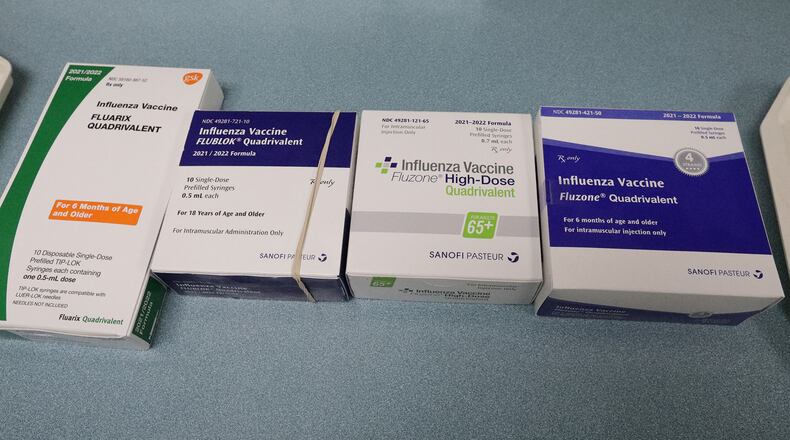Given the high level of COVID-19 cases and shortage of health care workers, people are urged to seek a flu shot to protect each other and health care capacity.
“It is safe to get your flu shot at the same time as your COVID vaccine or booster,” said Sarah Hackenbracht, president and CEO of the Greater Dayton Area Hospital Association.
Past flu seasons don’t predict what will happen in the next flu season, but generally Ohio flu cases and hospitalizations start to climb in mid- to late December.
For west central Ohio, there were 24 influenza-associated hospitalizations and 318 outpatient flu cases reported for the week of Dec. 12-18, which is the latest report published. Statewide, there were 60 flu-related hospitalizations that week.
Dan Suffoletto, spokesman for Public Health - Dayton & Montgomery County said people can make appointments at the department’s clinic by calling 937-225-5550. They are closed on Friday for New Year’s Eve.
Only 122 flu hospitalizations were reported in Ohio last season, which was unusually low. In other recent years, annual flu season hospitalizations have ranged from about 8,600 to 17,400.
Hackenbracht said the recent increase in flu cases and hospitalizations has been predominately influenza A.
Based on the five-year trend data, the next four weeks will be telling from a perspective of how much additional strain the flu will place on the region’s hospitals, according to Hackenbracht.
Health officials urge flu vaccines for everyone 6 months and older to lower people’s personal risk, to protect the people around them, and to help preserve hospital capacity since COVID-19 is also present.
Flu shots are available at many pharmacies, public health clinics, primary care practices, workplaces and pop-up clinics. You can also search for a flu vaccine near your home at vaccines.gov/find-vaccines/.
People at higher risk of serious flu complications include young children; pregnant people; people with certain chronic health conditions like asthma, diabetes or heart and lung disease; and people 65 years and older, according to the Centers for Disease Control and Prevention.
If people at higher risk from flu get flu symptoms, they could benefit from taking influenza antiviral drugs early after symptoms start and should call their health care provider early to ask about antivirals.
The CDC also advises that vaccination is important for health care workers, and other people who live with or care for people at higher risk to keep from spreading flu to them. This is especially true for people who work in long-term care facilities, which are home to many of the people most vulnerable to flu.
Along with vaccines, other prevention steps include avoiding close contact with sick people, covering coughs and sneezes, and frequent hand washing. The CDC recommends people recovering from flu stay home for at least 24 hours after any fever is gone, unless leaving to get medical care or another necessity.
Flu symptoms include fever, cough, sore throat, runny or stuffy nose, body aches, headache, chills and fatigue. Some people also may have vomiting and diarrhea.
Find a flu vaccine
Flu shots are available at many pharmacies, public health clinics, primary care practices, workplaces and pop-up clinics. You can also search for a flu vaccine near your home at vaccines.gov/find-vaccines/.
Public Health - Dayton & Montgomery County appointments can be made by calling 937-225-5550. They are closed on Friday for New Year’s Eve.
About the Author

